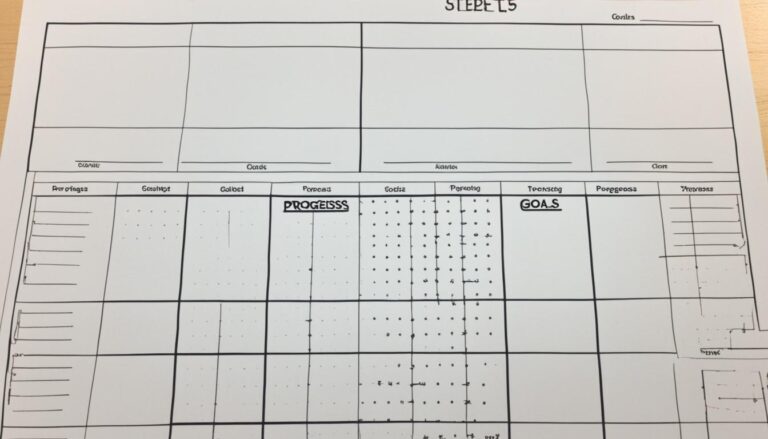Achieve Your Peak with Clear Organizational Goals

Are you ready to soar to new heights of success and productivity? It starts with setting clear organizational goals that pave the way for extraordinary achievements. Whether you’re an individual striving for personal growth or a business aiming to surpass industry benchmarks, having well-defined company objectives is the key to unlocking your full potential.
Many organizations underestimate the power of goal setting and fail to realize the impact it can have on driving performance. But did you know that companies with clear and focused business targets are more likely to experience significant growth and success?
In this article, we will explore the critical role of strategic planning and goal setting in maximizing performance. We’ll delve into the strategies for achieving peak performance, maximizing team engagement, and empowering your team to reach new heights. Together, we’ll unlock the secrets of success and help you achieve your peak potential.
Key Takeaways:
- Clear and measurable goals provide direction, focus, and a sense of purpose.
- Setting specific, measurable, attainable, relevant, and time-bound targets is essential for effective goal setting.
- Strategies for achieving peak performance include goal evaluation, regular feedback and recognition, creating a culture of ongoing learning and growth, and gaining leadership support.
- Maximizing team engagement involves utilizing an employee engagement platform, identifying areas of improvement, setting clear expectations, and developing a culture of excellence.
- Empowering your team involves fostering collaboration, embracing resourcefulness, investing in leadership development, and learning from mistakes.
Strategies for Achieving Peak Performance
To achieve peak performance and unlock your full potential, it is crucial to adopt effective strategies that propel you towards your goals. Here are some key strategies that can help you reach new heights:
Setting Clear Goals
Clear and measurable goals provide you with a sense of direction and purpose. By setting specific targets, you can focus your efforts and evaluate your progress effectively. Monitoring your performance indicators and Key Performance Indicators (KPIs) enables you to gauge your mission achievement and make necessary adjustments along the way. Ensure that you align your goals with the organization’s objectives to contribute to overall success.
Adopting Regular Feedback and Recognition
Feedback and recognition play a pivotal role in personal and professional growth. Embrace a culture of ongoing learning by seeking feedback from colleagues, managers, and mentors. Actively listen to constructive criticism and use it as an opportunity for improvement. Similarly, acknowledge and celebrate your achievements to stay motivated and enhance your performance.
Creating a Culture of Ongoing Learning and Growth
Continuous learning is pivotal for maintaining peak performance. Strive to expand your knowledge and skills through workshops, training programs, and self-study. Embrace a growth mindset that encourages curiosity and a thirst for knowledge. Encourage your team members to engage in personal development, fostering a collective commitment to growth and improvement within the organization.
Measuring Performance
Regularly evaluating your performance is essential for understanding areas of strength and identifying opportunities for improvement. By measuring your progress against predefined goals and KPIs, you can gain valuable insights into your performance and make informed decisions. Be proactive in monitoring your performance indicators and take necessary steps to align your actions with mission achievement.
Overcoming Resistance to Change
Change is a constant in the modern business landscape. Adapting to change and embracing new methodologies and technologies is crucial for maintaining peak performance. Overcome resistance to change by fostering open communication, providing adequate support and resources, and emphasizing the benefits of embracing innovation.
Gaining Leadership Support
Effective leadership is instrumental in fostering a high-performance culture. Seek the support and guidance of leaders within your organization. Engage with them to align your goals, secure necessary resources, and gain valuable insights. By building strong relationships with leaders, you can harness their expertise and experience, enabling you to excel in your role.
By implementing these strategies, you can enhance your performance, contribute to the achievement of organizational goals, and unlock your full potential. Remember to evaluate your progress regularly, adapt to change with resilience, and seek support and guidance from leaders as you embark on your journey towards peak performance.
| Strategies for Achieving Peak Performance | Benefits |
|---|---|
| Setting Clear Goals | Provides direction and focus |
| Adopting Regular Feedback and Recognition | Promotes growth and motivation |
| Creating a Culture of Ongoing Learning and Growth | Fosters continuous improvement |
| Measuring Performance | Facilitates informed decision-making |
| Overcoming Resistance to Change | Enables adaptability and innovation |
| Gaining Leadership Support | Provides guidance and resources |

Maximizing Team Engagement
To create a collaborative work environment, maximizing team engagement is crucial. This involves fostering active participation, idea sharing, and providing resources for reaching team potential. One effective way to achieve this is by utilizing an employee engagement platform.
An employee engagement platform serves as a centralized hub for communication, collaboration, and recognition within the organization. It bridges communication gaps, enabling teams to connect, share ideas, and stay informed about goals and progress. Through this platform, team members can actively participate in discussions, offer feedback, and contribute their unique perspectives to enhance team dynamics.
Furthermore, an employee engagement platform provides an avenue for team activities, allowing individuals to collaborate on projects, share knowledge, and collectively problem-solve. By facilitating team activities, such as virtual brainstorming sessions, team-building exercises, or cross-functional collaborations, the platform enhances camaraderie and strengthens bonds among team members.
Setting Clear Goals and Expectations
To maximize team engagement, it is crucial to set clear goals and expectations. When team members have a clear understanding of what is expected of them and the team as a whole, they can align their efforts towards achieving these goals. Clear goals provide a sense of purpose and direction, fostering motivation and commitment within the team.
Developing a Culture of Excellence
Another key component of maximizing team engagement is cultivating a culture of excellence. This involves creating an environment where individuals are encouraged to continuously improve and strive for their best. By emphasizing the pursuit of excellence, teams can push boundaries, innovate, and deliver exceptional results.

Empowering Your Team
Empowering a team involves fostering collaboration, input, and engagement in decision-making. When team members feel valued, supported, and trusted, they are more likely to perform at their best. Embracing resourcefulness and investing in leadership development, such as online executive MBA programs, can also contribute to team empowerment. Learning from mistakes and recognizing and rewarding success are important aspects of empowering a team.
Leadership dynamics play a crucial role in creating an environment that empowers teams. Effective leaders understand the strengths and weaknesses of their team members and provide them with the necessary resources and support to excel. By encouraging open communication, active participation, and idea sharing, leaders can foster a collaborative and innovative work culture.
Teamwork is another essential component of team empowerment. When team members work together, leveraging their unique skills and perspectives, they can accomplish more than they could individually. Effective collaboration requires clear goals, open communication, and mutual respect.
Resourcefulness: Fueling Team Empowerment
Resourcefulness is a key attribute that promotes team empowerment. Encouraging team members to think outside the box, find creative solutions, and leverage available resources allows them to overcome challenges and achieve their goals. Resourcefulness cultivates a sense of ownership and accountability within the team, as members take initiative and find innovative ways to contribute to the team’s success.
Investing in leadership development programs, such as online executive MBA programs, can greatly enhance the resourcefulness of team leaders. These programs provide them with the necessary knowledge and skills to effectively lead and empower their teams. By equipping leaders with the tools and strategies to navigate complex challenges and drive innovation, organizations can foster a culture of resourcefulness and continuous improvement.
Learning from Mistakes and Recognizing Success
An important aspect of team empowerment is creating a safe space for learning and growth. Team members should feel comfortable taking risks, making mistakes, and learning from them. When mistakes occur, leaders should view them as opportunities for growth and provide guidance and support for improvement.
At the same time, it’s essential to recognize and reward the successes achieved by the team. Celebrating milestones, achievements, and individual contributions not only boosts morale but also reinforces a sense of empowerment and motivation within the team.

Effective team empowerment requires a combination of leadership dynamics, teamwork, and resourcefulness. By fostering collaboration, providing leadership development opportunities, encouraging resourcefulness, and creating a culture of learning and recognition, organizations can unlock the full potential of their teams and achieve remarkable results.
Conclusion
Leadership plays a vital role in driving organizational success. By implementing effective strategies for goal setting, performance management, team engagement, and leadership support, you can unlock your organization’s full potential and achieve peak performance.
Creating a culture of excellence, continuous learning, and growth is essential for fostering an environment where individuals and teams can thrive. By providing opportunities for motivation and personal development, you can inspire your employees to perform at their best and contribute to the overall success of the organization.
Furthermore, recognizing achievements and embracing mistakes as learning opportunities promotes a culture of accountability and growth. By encouraging your team to learn from their experiences, you create an environment where innovation and improvement flourish, leading to ongoing performance improvement and long-term success.
Investing in leadership development and empowering your team also significantly contribute to organizational success. Embracing resourcefulness, teamwork, and effective communication dynamics can foster collaboration and build trust among team members. By valuing your employees, offering leadership programs, such as online executive MBA, and providing the necessary resources, you empower your team to take ownership of their work and make significant contributions to the organization’s goals.






